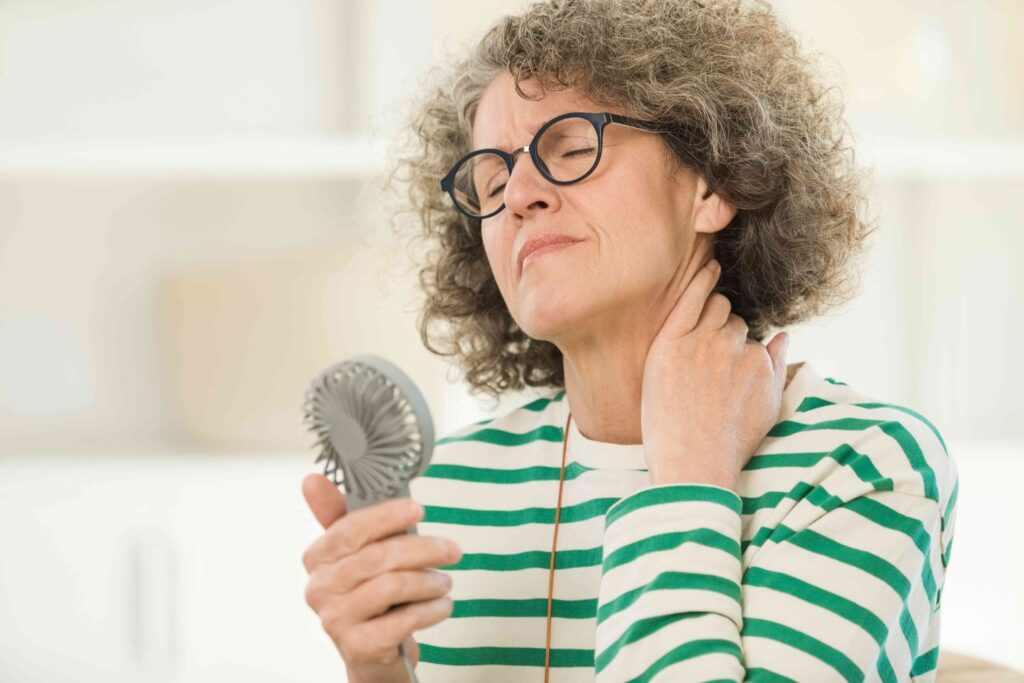:max_bytes(150000):strip_icc():format(jpeg)/Health-GettyImages-1638087699-7c892d63660d4a46b0bc1489a11071b3.jpg)
Postmenopause refers to the time after menopause, when you’ve had 12 consecutive months without a period. You may experience fewer or less intense symptoms than you did in the time leading up to or during menopause. However, some people continue to experience menopause symptoms for several years. Other symptoms, such as vaginal dryness, may also be more common.
Postmenopausal symptoms can include physical discomfort as well as emotional changes. Because levels of the reproductive hormones estrogen and progesterone have decreased, you may experience symptoms such as hot flashes, vaginal dryness, and changes in sexual function.
Several physical changes can occur after menopause, including vaginal dryness, hot flashes, and hair loss.
Vaginal Dryness
Vaginal dryness is a common symptom post-menopause. Dryness can lead to discomfort or irritation during everyday activities or sex, small vaginal tears, and an increased risk of urinary tract infections (UTIs) and sexually transmitted infections (STIs).
Some people may also experience vaginal atrophy, where the tissue lining inside the vagina becomes thinner, dryer, and inflamed.
Hot Flashes and Night Sweats
Hot flashes and night sweats you experienced during perimenopause (the time leading up to menopause) and menopause commonly continue well into the postmenopausal years. Some people may experience these symptoms for decades after menopause.
Hot flashes are periodic feelings of overwhelming heat, sweating, and flushing. More than a third of women in postmenopause still experience hot flashes 10 or more years after menopause. Hot flashes can also occur as profuse sweating at night or during sleep, or night sweats.
Hair Loss
Hormonal changes can also lead to hair thinning or hair loss. Research suggests that postmenopausal hair loss may be linked to higher levels of male sex hormones, called androgens, like testosterone and dihydrotestosterone (DHT). Genetics, stress levels, and diet may also impact hair loss or thinning.
Dry Skin
Several factors may cause dry skin or other skin changes after menopause. As you age, your skin naturally loses the ability to hold water. Declining estrogen levels also impact the skin’s strength and elasticity. These effects are compounded by the age-related loss of collagen, resulting in more wrinkles, fine lines, and irritated or sagging skin.
Between 15-50% of postmenopausal women may experience emotional and cognitive symptoms like anxiety, depression, and trouble sleeping.
Mood Changes, Anxiety, and Depression
Hormonal fluctuations can lead to mood changes, anxiety, and depression for some people. You may cry more than usual, feel irritable or anxious, or experience other changes in your mood.
Some research suggests that severe depression is more common after menopause than during perimenopause. Up to 44% of people in postmenopause may experience depression.
Trouble Sleeping
As many as 40-60% of people in any stage of menopause, including postmenopause, report sleep disturbances. Many people experience insomnia or wake up frequently during the night due to factors like hot flashes, night sweats, and stress.
The menopausal transition, including the time after, can impact sexual health, as hormonal fluctuations impact vaginal health and libido (sexual drive). These changes can affect intimate relationships and self-esteem.
Decreased Libido
Low libido, or decreased sex drive or sexual interest, is common after menopause. This change may be due to hormonal changes, but stress, vaginal dryness, and other physical discomfort during the postmenopausal phase can also change your desire for sex.
Urinary Incontinence
Urinary incontinence is leaking urine or having trouble holding it in. It affects up to 50% of people in the phase after menopause. Genetics and an inactive lifestyle can contribute to incontinence as well. You may experience trouble using the restroom, frequent and uncontrollable urges to urinate, or difficulty controlling your urine stream.
Pain or Discomfort During Sex
Vaginal dryness, vaginal atrophy, and mood changes may cause you to feel pain or discomfort when you have sex. Research shows that the decline in sexual function that can take place during perimenopause can continue 1-5 years after menopause.
Vaginal Bleeding
Up to 10% of people in postmenopause may experience bleeding. Overall, healthcare providers consider vaginal bleeding, even if only spotting, after menopause to be an abnormal symptom. It could indicate a more serious condition. Talk to a healthcare provider as soon as possible if you have vaginal bleeding after menopause.
Many postmenopausal symptoms are normal and may not impact your quality of life. If your symptoms bother you, affect your quality of life, or interfere with your daily functioning, your healthcare provider can help.
In certain cases, like vaginal bleeding or severe, persistent symptoms, it’s especially important to contact your provider. Some symptoms should improve as you get further out from menopause. It’s also worth talking to a healthcare provider if symptoms stay or become more severe.
Some of the most common symptoms after menopause are vaginal dryness, hot flashes, night sweats, mood changes, and changes in sexual health. Symptoms often become milder over time. Contact your healthcare provider if your symptoms remain severe or you have postmenopausal bleeding.













